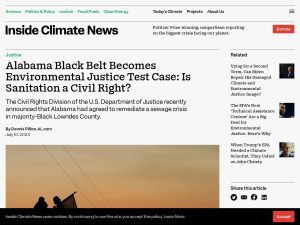
Toxic coal ash: EPA says Alabama doesn't protect public or waterways from contamination
St. Clair County — Coal ash contamination threatens our waterways, wildlife, fish and drinking water according to the Environmental Protection Agency. The EPA says Alabama’s plan to clean up the toxic industrial waste does not do enough to protect the public. The agency is proposing to deny Alabama’s permit program.

Alabama Black Belt Becomes Environmental Justice Test Case: Is Sanitation a Civil Right?
The Civil Rights Division of the U.S. Department of Justice recently announced that Alabama had agreed to remediate a sewage crisis in majority-Black Lowndes County.

Public hearing on coal ash storage in Alabama this week: EPA challenges Alabama's controversial environmental strategy
MOBILE, Ala. (WPMI) — This Wednesday you can voice your opinion about how coal ash is stored in Alabama. The Environmental Protection Agency is holding a public hearing in Montgomery. The hearing follows the EPA’s announcement in August that it was cracking down on how the state allows utilities to store coal ash, which is the byproduct from coal-fired power plants that contains contaminants like mercury and arsenic. The Alabama Department of Environmental Management approved the plan for Alabama Power to cap and keep in place the coal ash at Plant Barry that sits on Mobile River in Mobile County.